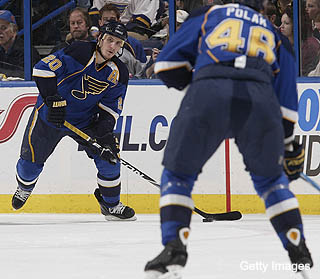
There was a point during the fantasy camp I attended last week where Bryan Trottier literally stopped practice, made the guests partner up and had them work on passing like nine year olds.
(This should have happened far sooner ? he was just being polite before finally deciding enough's enough).
When you watch professional hockey players pass the puck, you'll note that they move it just about as hard as amateurs can shoot the thing. When you mix passes like those in with the odd guy who's leaning so hard on his stick that he's basically a tripod, it's going to be an ugly affair.
The higher you go in hockey, the more you understand just how important passing the puck hard is.
For one, it's unfair to give your teammate a slow pass because it takes away his time (and in turn, his options) before he has to make a decision with the puck. In a game where big men are constantly looking for opportunities to plow a guy, you don't want to leave your buddy in that situation. If you snap it over there hard, he has time to pick his head up, step off the trolley tracks and continue forward with his limbs intact.
A professional hockey practice is littered with the phrase "handle it!" at pretty much every level. You're expected to learn how to handle a pass with some heat on it over time. Since having just one hand on your stick and holding it out is enough to deaden a pass (especially on the backhand), there's no excuse to not pick up a rocket launched your way.
The other frequently used expression is "you can't give a good player a bad pass," which is further incentive to hustle the puck over there. That phrase essentially means that if you put it anywhere in a guy's vicinity with some zip on it ? in his skates, in his triangle, backhand, forehand, wherever ? it's on him to corral the thing. Obviously you'd like to hit him square in the tape, but pros are good enough that they should be able to control a wayward puck and make a play.
 And they are ? you can basically fire a knuckleball at an NHLer's waist and he'll have it caught and flat on the ice in one second flat.
And they are ? you can basically fire a knuckleball at an NHLer's waist and he'll have it caught and flat on the ice in one second flat.
What they can't do is get the puck to come to them faster.
They may know that as soon as they get it, there's a linemate sneaking behind the opposing 'D' for a stretch pass. If they don't get it soon enough, that fleeting opportunity will be lost. You have to give the recipient credit enough that he can deal with whatever you send him.
(Before I carry on: Of course there's a time and place for spot passes and a little tender touch. But as a general rule, the sooner you can deliver your package the better.)
A number of NHL D-men have made a career off making that good, hard, flat first pass. It should be remarkably simple and easy, but like a 3-foot putt, people still struggle to do it consistently.
The guys who have it down can get rich. It's one of those things that's tough to demonstrate statistically, being that there's no "first passes completed with authoritaw" metric, but coaches and scouts know the people that can bring this quality to their back end, and they pay them accordingly.
The lazy pass is the most frustrating thing for pros when you mix them in with amateurs. The lesser rec league passer starts with the puck too far in front of his body and gives it a flick ? if they're moving it to a pro (who can get across the neutral zone in about two seconds), that extra second it takes the puck to get there puts him directly in coverage before he has the chance to do anything.
So start the puck equal to your side or behind you, and snap it forward like you mean it.
Nobody's ever been yelled at for getting the puck to their teammate too soon, but I've seen teammates nearly come to blows on the bench over a slow rolling pass nearly getting one of them killed.
Davidson, AllanAllan Davidson Day, HapHap Day DeBoer, PeterPeter DeBoer Delvecchio, AlexAlex Delvecchio Denneny, CyCy Denneny
No comments:
Post a Comment